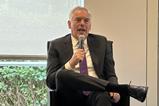PwC will pay a reduced fine of 1.75 million pounds (U.S. $2.1 million) as part of sanctions against the Big Four firm for failures in its fiscal year 2017 audit at BT Group after the U.K. telecommunications company adjusted its financials to reflect a fraud scandal in Italy.
The Financial Reporting Council (FRC) announced the penalty Monday, in addition to a severe reprimand and requirement PwC declare its audit report did not meet relevant standards. The firm avoided a £2.5 million (U.S. $3 million) fine from the regulator for early admissions.
Also disciplined was Richard Hughes, who served as engagement partner and senior statutory auditor for PwC on the BT audit. Hughes received a reduced fine of £42,000 (U.S. $51,000), a reprimand, and must similarly declare not meeting relevant standards.
The details: BT in July 2016 was informed by a whistleblower of fraud at its Italian business, the FRC stated in its decision notice. An outside analysis of the allegations revealed in January 2017 accounting irregularities that were the result of “misrepresentation” and “fictitious transactions,” leading BT to recognize adjustments addressing prior period error corrections and accounting estimate changes totaling approximately £513 million (U.S. $622 million) in its 2017 financial statements.
PwC recognized this disclosure as a significant risk demanding extra attention. However, particularly regarding £72 million (U.S. $87 million) in debt adjustments included among the accounting estimate changes, the firm “failed to act with the requisite professional skepticism; did not obtain sufficient appropriate audit evidence; and did not properly determine whether the changes in accounting estimates were appropriate,” the FRC contended.
Hughes was serving his first year as audit engagement partner at BT. He and PwC were further faulted for not preparing audit documentation “sufficient to enable an experienced auditor, having no previous connection with the audit, to understand the nature, timing, and extent of the audit procedures performed in relation to the BT Italy adjustments, generally,” the FRC stated.
As a result of the deficiencies, PwC and Hughes breached International Standards on Auditing 200, 230, 500, and 540.
The FRC added its executive counsel “has not made a finding that the 2017 financial statements were misstated; that the total sum of the BT Italy adjustments was wrong; or that the breaches were intentional, dishonest, or reckless.” In its decision notice, the regulator noted a member of PwC’s U.S. regulatory advisory team found the ratio of BT’s adjustments “unusual” and said such a finding should have prompted additional skepticism in case a restatement would have been necessary in accordance with U.S. reporting requirements.
The FRC also investigated PwC’s audits of BT’s financial statements for the fiscal years ending 2015 and 2016. Those matters were closed without enforcement.
PwC response: “We are sorry that aspects of this audit were not of the required standard,” a firm spokeswoman said in an emailed statement. “The FRC’s finding relates to a narrow element of the audit, and the regulator has not found that the 2017 financial statements for BT were misstated, or that the sum of the BT Italy adjustments was wrong.
“… We have made significant investment in strengthening audit quality in recent years, which has been recognized in improved quality inspection results. We remain committed to maintaining and building on this progress through the delivery of consistently high-quality audits.”


















No comments yet